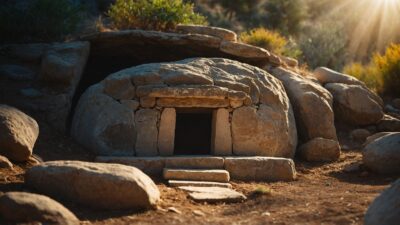
Repentance is a cornerstone of the Christian faith, yet many people don’t truly understand what it is.
Biblically, to repent is to do more than just apologize or feel sorry for your behavior; in the Bible, repentance is all about turning.
The Hebrew concept of repentance means “to return” or “to turn again” to God. Biblical repentance is the change of heart and mind that literally stops and changes direction, away from sin and everything God rejects, turning again to God.
Once we understand the gospel framework, repentance makes sense and quickly becomes a bedrock of our salvation.
Old Testament Context
The concept of repentance is present throughout the entire Biblical landscape. The book of Job, generally believed to be the oldest book of the Bible, includes the concept of repentance toward God (Job 42:5-6), even before the establishment of a covenant. Ever since man became disobedient, there has been a need for and even an instinct toward repentance.
Man was made in the image of God, designed to speak to and for God in the earth; we are designed to live in a God-facing position. When we find ourselves in a different position and we love God, our response is to repent, or turn again toward God.
When God introduced covenant relationship to humanity, repentance was an integral part of the process. In order to have relationship there must be consistent focus; to maintain focus on a holy God, imperfect people must be allowed to repent.
Prayers and psalms of repentance are recorded in the Old Testament from everyone who walked closely with God. All who know God understand that we must first align ourselves with his word and his will before we can successfully cooperate with God. We must come into agreement with God and establish disagreement with every influence that is not from God.
This is the kind of repentance that God responded favorably to.
John the Baptist
Before John the Baptist began his ministry preaching and baptizing people unto repentance, Israel was in a backslidden state of religiosity. They had abandoned the true focus of their covenant with God, which was relationship with him, and turned the Law of Moses and the standards of holiness unto God into a status symbol.
The more outwardly religious you were, the more approval you received from the Pharisees and leaders. These whose hearts had strayed far from God abused power and used adherence to tradition and ordinances as a measure for righteousness.
When John the Baptist began his prophetic ministry, Israel had not heard the prophetic voice of God for 400 years. The return of the prophetic in the Gospel of Repentance was a sign to God’s children that they could feel safe returning to him with all their heart, for God was not angry but full of compassion and ready to forgive.
God was preparing the way for the coming Messiah, and the invitation to return to the heart of the covenant and be blessed was open to all God’s people, should they simply turn from their sin and idolatry, and return their focus to God and his true kingdom agenda.
New Testament Context
In the New Testament, the Gospels begin with the message of repentance, preached both by John the Baptist and Jesus Christ.
The call to repentance, for Jews, was either refreshing or offensive. The Pharisees and religious leaders believed they were living up to the standards of the Law of Moses as God prescribed. How could they then be called to repent, or to turn again to God? They believed they already upheld God’s ways.
John the Baptist openly challenged the Pharisees and Sadducees on their hypocrisy (Matthew 3:7-10), not respecting any religious pedigree over the word of God that was revealed to him. The message of repentance was for all of Israel, and much to the surprise of many, it was for Gentiles as well – the kingdom of God was open to all who would repent and believe in Christ.
This truth of salvation for all mankind was hidden in the call to repentance.
What This Means for Me
Our walk with God is essentially a progressive act of repentance; the more we learn and grow, the longer we stay focused before we get distracted and have to re-turn to God. It’s the most amazing blessing and generous gift for God to come to earth as a man, fulfill the covenant requirements for salvation, and then extending that salvation to all who would repent and believe the good news of this reconciliation to God by the blood of Jesus Christ.
What a great God we serve!
Let us always turn toward God, away from everything that disagrees with him and is not like him.
❤️
Key Study References
Job 42:5-6
2 Chronicles 7:14
Matthew 3:1-12
Mark 1:4-8
Job 42:5-6
My ears had heard of you but now my eyes have seen you. Therefore I despise myself and repent in dust and ashes.
2 Chronicles 7:14
If my people, which are called by my name, shall humble themselves, and pray, and seek my face, and turn from their wicked ways; then will I hear from heaven, and will forgive their sin, and will heal their land.
Matthew 3:1-12
1 In those days came John the Baptist, preaching in the wilderness of Judaea, 2 And saying, Repent ye: for the kingdom of heaven is at hand.
3 For this is he that was spoken of by the prophet Esaias, saying, The voice of one crying in the wilderness, Prepare ye the way of the Lord, make his paths straight.
4 And the same John had his raiment of camel’s hair, and a leathern girdle about his loins; and his meat was locusts and wild honey. 5 Then went out to him Jerusalem, and all Judaea, and all the region round about Jordan, 6 And were baptized of him in Jordan, confessing their sins.
7 But when he saw many of the Pharisees and Sadducees come to his baptism, he said unto them, O generation of vipers, who hath warned you to flee from the wrath to come? 8 Bring forth therefore fruits meet for repentance: 9 And think not to say within yourselves, We have Abraham to our father: for I say unto you, that God is able of these stones to raise up children unto Abraham. 10 And now also the axe is laid unto the root of the trees: therefore every tree which bringeth not forth good fruit is hewn down, and cast into the fire.
11 I indeed baptize you with water unto repentance: but he that cometh after me is mightier than I, whose shoes I am not worthy to bear: he shall baptize you with the Holy Ghost, and with fire: 12 Whose fan is in his hand, and he will throughly purge his floor, and gather his wheat into the garner; but he will burn up the chaff with unquenchable fire.
Mark 1:4-8
4 John did baptize in the wilderness, and preach the baptism of repentance for the remission of sins. 5 And there went out unto him all the land of Judaea, and they of Jerusalem, and were all baptized of him in the river of Jordan, confessing their sins. 6 And John was clothed with camel’s hair, and with a girdle of a skin about his loins; and he did eat locusts and wild honey; 7 And preached, saying, There cometh one mightier than I after me, the latchet of whose shoes I am not worthy to stoop down and unloose. 8 I indeed have baptized you with water: but he shall baptize you with the Holy Ghost.


